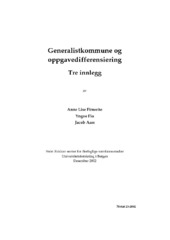| dc.contributor.author | Fimreite, Anne Lise | eng |
| dc.contributor.author | Flo, Yngve | eng |
| dc.contributor.author | Aars, Jacob | eng |
| dc.date.accessioned | 2006-06-22T08:39:32Z | |
| dc.date.accessioned | 2020-12-10T06:31:37Z | |
| dc.date.available | 2006-06-22T08:39:32Z | |
| dc.date.available | 2020-12-10T06:31:37Z | |
| dc.date.issued | 2002-12 | eng |
| dc.identifier.issn | 1503-0946 | |
| dc.identifier.uri | https://hdl.handle.net/1956/1417 | |
| dc.description.abstract | This Note describes three lectures by representatives of the Rokkan Centre. The lectures were commissioned by the Department of Local Government of the Ministry of Local Government and Regional Development, where they were also presented on Thursday 5 December 2002. The first lecture (by Yngve Flo) distinguishes between a general purpose municipality and a system of such municipalities, and these two phenomena are discussed from a historic perspective. The presentation concludes by considering the ideal construction of postwar social democracy, the executive local council, in which a coordinating function is regarded as a central feature of the general purpose municipality. The second lecture (by Anne Lise Fimreite) discusses recent developments in local government policy and presents a number of possible scenarios based on the assumption that Norway remains true to its general purpose municipality system. One of the main points made here is that in recent years the m ost important function of the general purpose municipality has consisted in what is best described as a negative freedom of action: it falls to the municipality to adapt the demands of local residents to a badly coordinated state system – demands which in sum overstretch the available resources and are hence unrealistic. The third lecture (by Jacob Aars) discusses what a differentiated division of responsibilities, and hence a differentiated local government system, might entail. A distinction is drawn between fundamentally different forms of differentiation, and the point is made that the right to independent action is of crucial importance: Is it the role of the state to delegate responsibilities in unequal ways between non-equivalent types of municipality? Should initiatives be primarily local (within the municipality or among the residents) or can hybrid forms be imagined? The relation between possible «A authorities» (with large areas of responsibility) and «B authorities» (with small areas of responsibility) is critically examined. It might be imagined that the structure of the «B authority» would have strong appeal, since it ought to entail greater municipal freedom. Yet this kind of structure can also imply weaker legitimacy for the municipality. | en_US |
| dc.description.abstract | I notatets første foredrag (av Yngve Flo) skilles det mellom en generalistkommune og et generalistkommunesystem, og disse to fenomenene blir drøftet i en historisk sammenheng. Fremstillingen slutter ved etterkrigstidens sosialdemokratiske idealkonstruksjon, forvaltningskommunen, der generalistkommunens samordningsfunksjon var et sentralt element. I det andre foredraget (av Anne Lise Fimreite) drøftes den nyere tids kommunalpolitiske utvikling, og enkelte scenario – gitt at Norge også i fremtiden holder fast ved et generalistkommunesystem – blir presentert. Et hovedpoeng er at generalistkom - munen i nyere tid synes å ha fått sin viktigste funksjon gjennom det som best kan defineres som en negativ handlefrihet: Det er kommunens oppgave å tilpasse kravene fra innbyggerne og en dårlig samordnet stat; krav som samlet sprenger de kommunale ressursrammer, til virkeligheten. I det tredje foredraget (av Jacob Aars) diskuteres det hva en differensiert oppgavefordeling og således et differensiert kommunalsystem vil kunne innebære. Det blir skilt mellom ulike prinsipielle former for differensiering, og det blir gjort et poeng av at plassering av initiativretten spiller en viktig rolle: Er det staten som skal fordele oppgaver ulikt på ulike kommunetyper, skal initiativet primært være lokalt (i kommunen eller hos innbyggerne) eller kan det tenkes blandingsformer? Forholdet mellom eventuelle «A-kommuner» (stort oppgavefelt) og «B-kommuner» (lite oppgavefelt) blir problematisert. Det kan tenkes at tilværelsen som «B-kommune» kan virke forlokkende, ut fra en forestilling om at den kommunale friheten da blir større. Samtidig kan en slik tilværelse svekke kommunens legitimitet. | no |
| dc.format.extent | 132317 bytes | eng |
| dc.format.mimetype | application/pdf | eng |
| dc.language.iso | nob | eng |
| dc.publisher | Stein Rokkan Centre for Social Studies | eng |
| dc.relation.ispartofseries | 23-2002 | |
| dc.relation.ispartofseries | Notat | no |
| dc.title | Generalistkommune og oppgavedifferensiering. Tre innlegg | nob |
| dc.type | Working paper | eng |
| dc.subject.nsi | VDP::Samfunnsvitenskap: 200 | nob |
